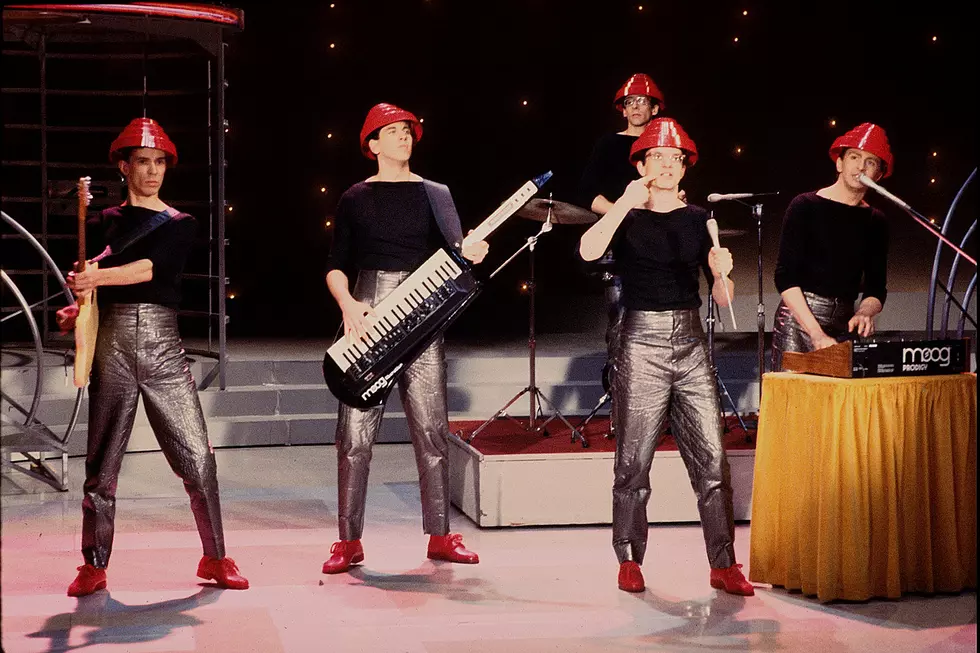The Story of Devo’s ‘Q: Are We Not Men? A: We Are Devo!’ Album Release
It's hard to believe it's been decades since the utterly unique worldview of Devo was delivered to the world by way of Akron, Ohio. It was first unleashed on the world on Aug. 28, 1978 in the form of their debut, Q: Are We Not Men? A: We Are Devo!
Their origins date back to Kent State University in the early '70s as a bizarre project brought to life by the minds of Gerald Casale and Mark Mothersbaugh. The wheels kept rolling on this vehicle, and by mid-decade, the odd mutation of confrontational philosophy, art and music had come together into an utterly unique whole. With the addition of Bob Mothersbaugh, Bob Casale and drummer Alan Myers, the lineup was complete, and in the fall of 1976, the band released their debut single, "Jocko Homo," backed with "Mongoloid."
As interest grew, the band released a single on the prestigious U.K. label Stiff Records, and sooner than you can say "Booji Boy," they signed to Warner Bros. for Are We Not Men? It's a timeless classic that is both rooted in its time and futuristic, even after all these years. The main reason it's endured is that, despite all the gimmicks involved in the world of Devo, this is one incredible batch of songs.
From the urgent riff of "Uncontrollable Urge" to the final brittle notes of "Shrivel Up," the record takes listeners on an unforgettable ride. Though you could dig beneath the surface and try to find links to the past, the sound of Devo almost seems to have sprung up from nothing. It has the vibrancy and enthusiasm of punk, but there are also traces of Kraftwerk, Faust, Captain Beefheart and even Duane Eddy woven in. It sounded like nothing that had come before.
Following the manic rush of "Uncontrollable Urge," the group digs into its take on the Rolling Stones standard, "(I Can't Get No) Satisfaction," turning the song inside out and upside down. Eschewing any sexual posturing Mick Jagger delivered, Devo brings out the desperation at the root of the song, and it's made all the more convincing by Mothersbaugh's delivery. The accompanying video, the first taste many got of the band, remains a classic. "Praying Hands" and "Space Junk" are both pop songs at heart -- albeit pop songs transmitted via alien airwaves. Most every song on the album is insanely catchy and full of hooks, deflating the argument that "art" need be difficult to be "genuine."
New recordings of both sides of the band's debut single round out side one. "Mongoloid" is a bit fast and tighter here than on the single, and it actually gains something along the way. The lyrics tell of a mundane, faceless life as the riff pounds through. "He wore a hat, and he had a job and he brought home the bacon so that no one knew."
Meanwhile, the band's signature call to arms, "Jocko Homo," ends the side on a note of triumphant prophecy. "They tell us that we lost our tails. / Evolving up from little snails / I say it's all just wind in sails / Are we not men? We are Devo!"
The lyrics deliver the mandate; they tell the truth. A truth that seems to become clearer with each passing year. The version here is tidier than the single and does lose some of it's original edge, but only slightly.
"Too Much Paranoias" kicks off things as we flip the LP over. Disjointed guitars ring out and manic tribal drums pound creating a mood of paranoia for the hyper active vocals of Mothersbaugh to sail upon. "Gut Feeling (Slap Your Mammy)" begins simple enough, with an almost Byrds-meets-Ventures guitar line, before gradually raising the stakes as it gets into the "Slap Your Mammy" section, at which point frantic poot-dancing is guaranteed. "Come Back Jonne" careens along like the theme from an imaginary TV show somewhere between Bonanza and Lost In Space. It's pure genius, and Devo even get in some tasty Chuck Berry-style guitar riffs.
"Sloppy (I Saw My Baby Gettin')" is another riff-driven rocker that steers clear of conventional terrain. "Shrivel Up" plays like a spy-thriller soundtrack envisioned by the Residents. It is an almost unsuspecting note on which to end the album, and therefore, it's a perfect way to end it.
Although Q: Are We Not Men? reached a respectable No. 78 on the Billboard 200, Devo were written off by many as a novelty act, or some kind of New Wave gimmick band. Time would serve up the cold hard facts of life to the skeptics. Devo would go on to make many more records, eventually achieve commercial success and ultimately be seen as the pioneers they truly were.
25 Bands You Won't Believe Aren't in the Rock and Roll Hall of Fame Yet
More From Diffuser.fm









